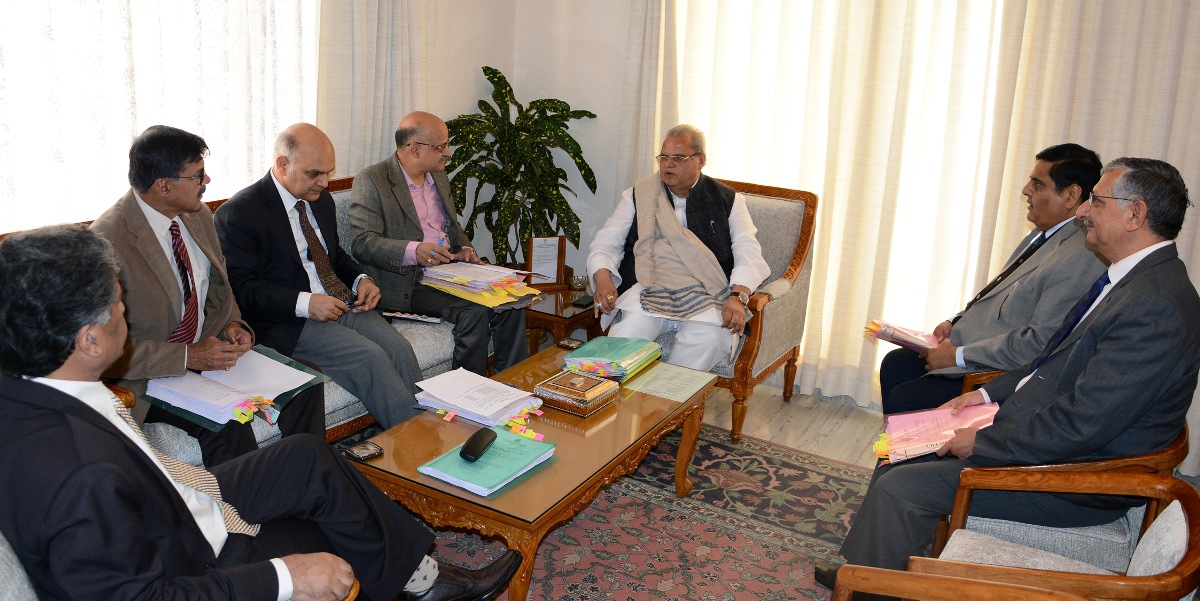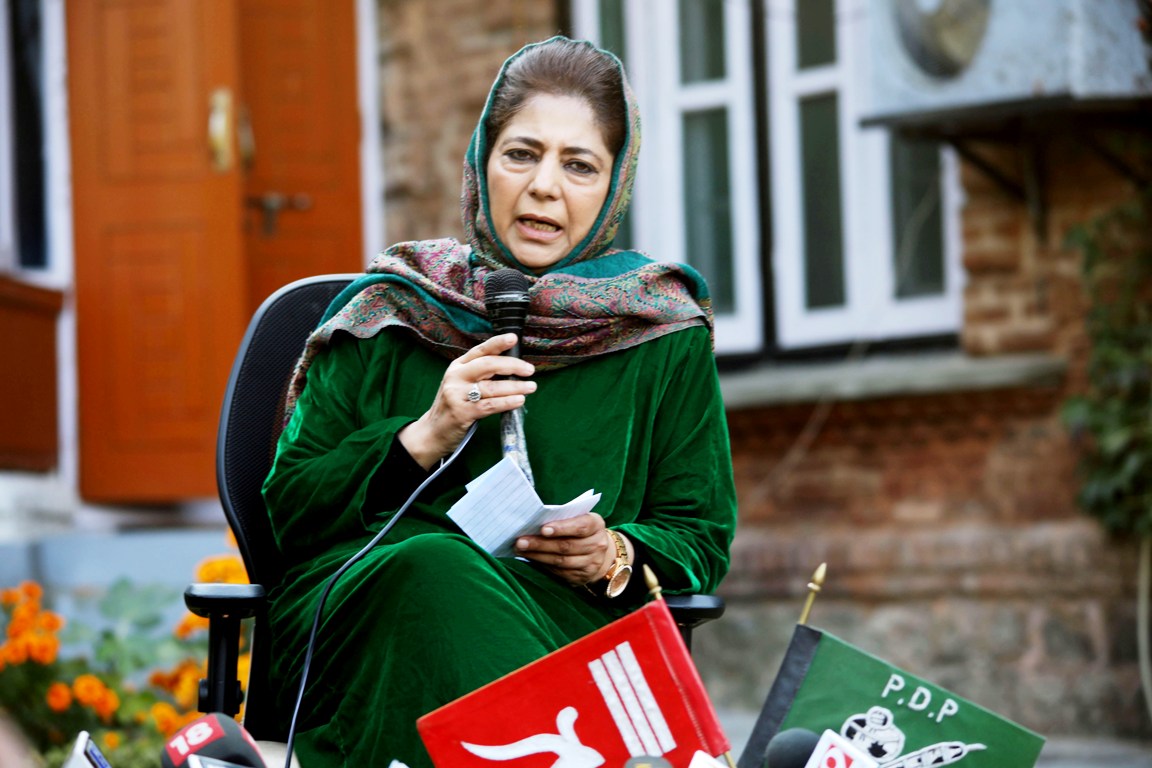Srinagar
Governor, Satya Pal Malik chaired the meeting of the State Administrative Council (SAC) at Raj Bhavan Jammu on Wednesday.

Advisors to the Governor, B B Vyas, K Vijay Kumar, Khurshid Ahmad Ganai, and K K Sharma, Chief Secretary BVR Subrahmanyam and Principal Secretary to the Governor, Umang Narula were present at the meeting.
The SAC deliberated upon the various proposals submitted by Administrative departments for its consideration and approval.
Roshni Scheme repealed
The State Administrative Council (SAC) approved the repeal of the Jammu and Kashmir State Lands (Vesting of Ownership to the Occupants) Act, 2001, (commonly known as Roshni scheme).
All pending proceedings under the Act shall stand cancelled immediately and abate. However, the SAC directed that any action taken under the provisions of the repealed Act shall not be invalid.
The Jammu and Kashmir State Lands (Vesting of Ownership to the Occupants) Act, 2001 was enacted in the year 2001 with the twin objective of generating resources for financing power projects and conferment of proprietary rights to the occupants of the State Land. The Act popularly called as Roshni Scheme was believed to be a revolutionary step in the annals of history in Jammu and Kashmir after the Agrarian Reforms Act. It was hoped that the legislation would help to boost the farming sector and in turn generate substantial revenue for funding power projects across the State. The rules under the Act were also notified.
It is pertinent to mention that under the provisions of the Act, applications for conferment of ownership rights were to be filed up to 31st March 2007. Any application filed after the said date was not to be considered under the provisions of the Act.
This would lead to the inference that the provisions of the Act had actually become inoperable viz-a-viz conferment of ownership rights on the State Land after 31st March 2007.
The Scheme initially envisaged conferment of proprietary rights of around 20.55 lakh Kanals to the occupants of which only 15.85% land was approved for vesting of ownership rights. Against the expected/anticipated revenue from such occupants, the revenue actually generated has been meager thereby failing to realize the objective of the Scheme. There have also been reports about the misuse of some provisions of the legislation.
It is significant to highlight that the entire legislation was challenged before the Hon’ble High Court of J&K, in a Public Interest Litigation titled Ankur Sharma V/s State, wherein the Hon’ble High Court besides staying the proceedings under the said Act also directed that neither the occupants having been conferred upon the ownership rights shall sell these lands nor can raise constructions on such lands. The said PIL is pending before the Hon’ble High Court.
The Hon’ble Court has also directed that no further transaction of any kind in respect of the property covered under the Roshni Act shall be affected till further orders of the Hon’ble High Court.
After careful consideration of all pros and cons of the Scheme, SAC concluded that the Scheme has not served the desired purpose and is no longer relevant in the present context.
SSB Selections: Waiting list limit enhanced to 50% to facilitate employment of educated youth
The State Administrative Council (SAC) approved enhancement in the waiting list from the existing 33.33% to 50% of the posts advertised, which shall extend to 100% wherever the number of posts is 10 or less, either under normal selection or under the provisions of SRO-202. The recommendation in this regard was made by the J&K Services Selection Board (JKSSB).
It is pertinent to mention here that Departments had been facing problems in filling vacancies referred for selection to the SSB due to non-joining of selectees. It has been observed that the Board conducts a common test for different non-gazetted posts with similar qualification/eligibility.
A candidate applied for more than one post gets actually selected for a number of posts but in the end, chooses the post of his choice. In this way, the other posts for which selection process is undertaken remain unfilled. These vacancies could not be filled from the same selection process in view of the limit on the operation of the waiting list.
This resulted in multiple advertisements for the vacancies referred to the SSB which not only was cumbersome and time-consuming but also resulted in wastage of resources without any dividends. This also deprived a candidate from selection who figured beyond the 33.33% waitlist despite the availability of vacancies in view of extant regulations.
The new regulations which shall come into force with immediate effect shall enable utilization of vacancies referred to SSB for selection, thereby addressing the aspirations of the educated youth.
SAC also directed the General Administration Department to incorporate a similar provision for Gazetted posts in the relevant rules in consultation with Jammu & Kashmir Public Service Commission.
In a first JK to get Gas Network
In today’s world, Natural Gas is the cleanest form of energy and is a non-pollutant. It is extremely useful both for heating and cooking purposes. There is a worldwide movement towards a Gas based economy with increasing use of Natural Gas in transport, industrial and domestic sectors.
Recognizing this, a nationwide City Gas Distribution network has been started across the Country.
Presently, Jammu and Kashmir is one of the few states which does not have a gas pipeline entering the state. One of the impediments to the expansion of the National Gas Grid to J&K were certain provisions in our Jammu & Kashmir Underground Public Utilities (Acquisition of Rights of User in Land) Act 2014, because of which projects could not be implemented.
The State Administrative Council (SAC) approved amendments to the above said Act to increase the timeline for completing the gas projects. The existing 2-year time limit was insufficient in view of the distinct topography and hilly terrain of our State which therefore required more time for implementation. This has been increased to 5 years. The increase in time limit will promote the participation of more gas companies in the bidding process once the Right of Way is awarded.
It is hoped that with the proposed amendment, J&K will have a gas pipeline to Srinagar by the end of the year 2019 and City Gas Distribution network’s in Jammu, Srinagar and other major towns within the next 18-24 months.
SAC approves legislation to streamline the working of NGOs/Societies
The State Administrative Council (SAC) approved the ‘Jammu & Kashmir Societies Registration (Amendment) Act, 2018’ to curb the mushroom growth of NGOs/Societies and streamline their functioning.
Provisions for renewal, appeal, de-registration and mandatory requirement of maintenance of accounts, address, details of members etc have been incorporated.
The amendment will help to streamline the various issues related to NGOs/Societies and improve accountability.















